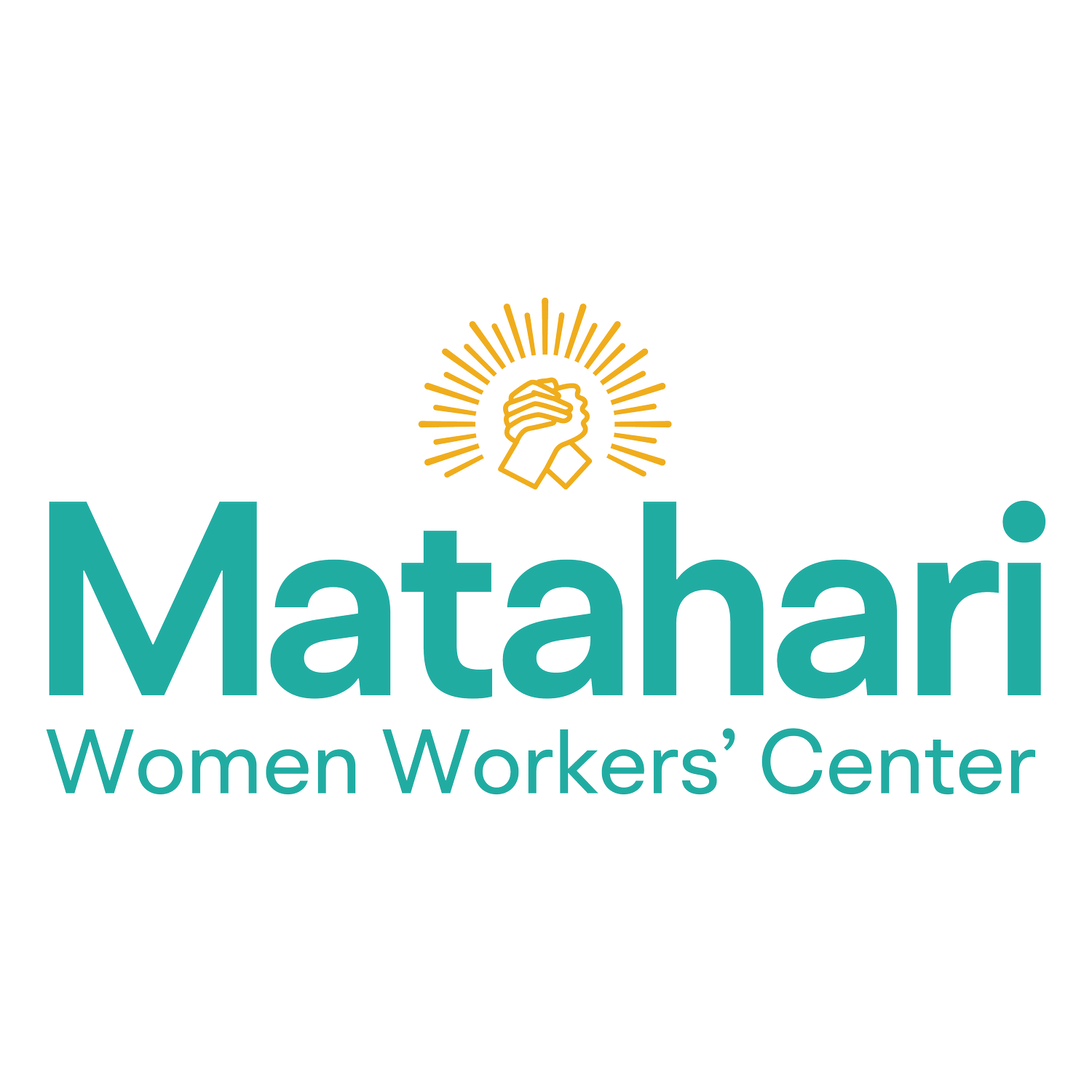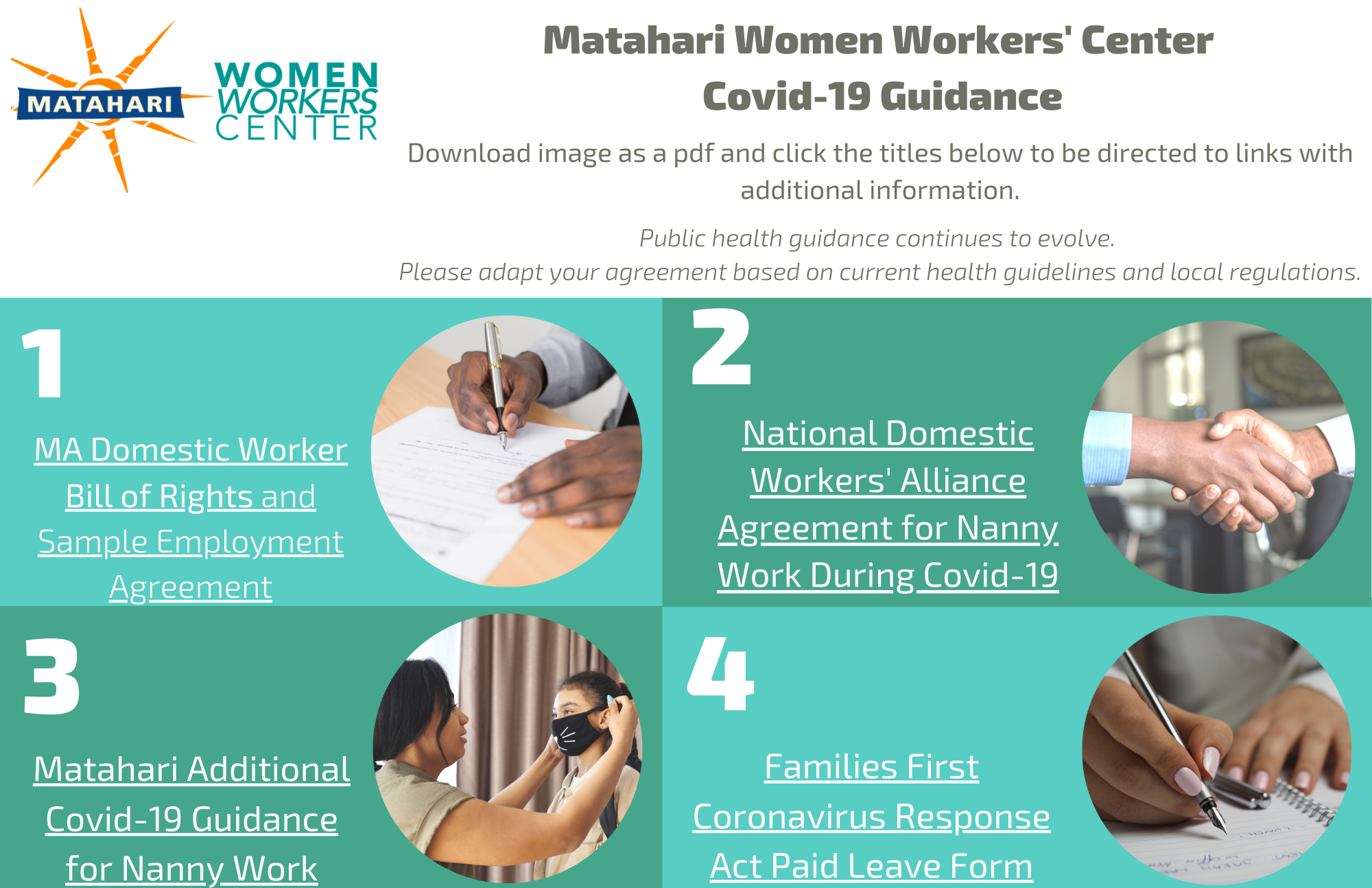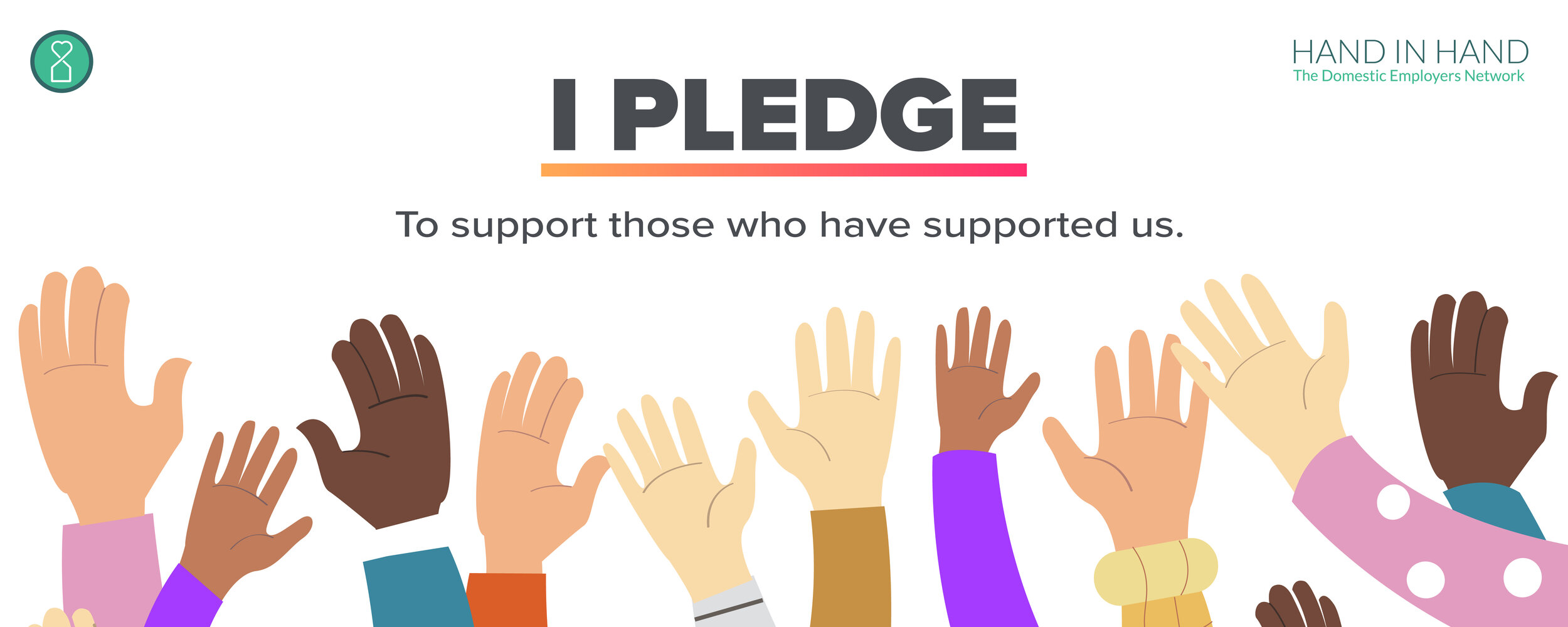Resources for Covid-19
Table of Contents
Worker Resources
Mutual Aid
Food Assistance
Rent Assistance
Employer Resources
Worker Resources
Covid-19 News & Updates
Covid-19 Essential Services FAQs by Mass.gov
Know Your Rights for Domestic Workers During the Pandemic: Frequently Asked Questions compiled by Matahari
Staying Safe at work
Matahari's Working During the Pandemic Guidance for Nannies and Nanny Employers: A digital packet compiled by Matahari member-leaders, including:
MA Domestic Worker Bill of Rights (Español | Português)
Sample employment agreement: A legal right for domestic workers in MA and a critical tool for clear communication during the pandemic. ( Español | Português)
Agreement for Nanny Work During Covid-19 from the National Domestic Workers' Alliance (Español)
Matahari’s Letter to Nannies and Nanny Employers: Recommendations for employer contributions to nannies health care costs, severance pay, and paid time off. (Español | Português)
Families First Coronavirus Response Act Paid Leave Form: A form to support nannies in accessing paid leave under the Families First Coronavirus Response Act. (Español)
Coronavirus Safety Tips & Resources for Domestic Workers: Staying home isn’t an option for many domestic workers. Refer to these tips and trainings compiled by the NDWA so you can continue to provide excellent care while keeping yourself, your family and clients safe.
Financial Resources
Unemployment Benefits
Apply for Unemployment Benefits online. Click here for a step-by-step process of what you can expect.
Pandemic Unemployment Assistance (PUA) provides up to 39 weeks of unemployment benefits to individuals who are not eligible for other types of unemployment. Learn more here.
Federal Pandemic Unemployment Assistance (FPUC) provides an additional $600 weekly benefit to those eligible for PUA.
Other Emergency Relief Funds:
One Fair Wage Emergency Fund: Open to service workers impacted by the pandemic.
Matahari Care Fund: Closed for new submissions.
Mass UndocuFund: Closed for new submissions.
Nanny Relief Fund: Closed for new submissions.
Domestic Employer Resources
Massachusetts COVID-19 Toolkit for Domestic Employers by Hand In Hand: The Domestic Employers Network
Pledge to continue paying the nanny, house cleaner or attendant you employ through this crisis
Mutual aid
Click here to find a Covid-19 Mutual Aid Networks in your neighborhood.
Mutual Aid Toolkit for volunteer-run and grassroots-led groups.
Covid-19 Financial Solidarity & Mutual Aid: An independent community effort to support individuals financially impacted by COVID-19. Anyone can submit a request and include relevant additional information about their preferred payment platform & contact details.
Food Assistance
City Mission Boston: Food Assistance Request for Boston residents; does not inquire about immigration status.
City of Boston: Map of Covid Food Resource Sites
Rent Assistance
City Mission Boston: Food Assistance Request for Boston residents; does not inquire about immigration status.Office of Housing Stability: If you’re at risk of being evicted, learn how to respond here.
Residential Assistance for Families in Transition (RAFT) & Emergency Rent and Mortgage Assistance (ERMA) provide short-term financial assistance to low-income families who are homeless or at risk of becoming homeless. Click here to learn about more about these programs from Metro Housing Boston, and submit an application.
Click here to learn about more about these programs from Metro Housing Boston, and submit an application.
CDC Eviction Moratorium: CDC Eviction Moratorium Information and Form.
MassAccess provides links to additional forms related to the CDC Moratorium.
City of Boston Rental Relief Fund: The fund assists tenants with their rental payments. The aid is available to income-eligible tenants in the city of Boston who do not have access to expanded unemployment benefits or, due to the nature of their jobs, the unemployment benefits they receive represent a significant reduction in their actual income.
City Life/Vida Urbana: They have a housing hotline in English and Spanish that you can call if you are in danger of being evicted and also host weekly meetings in both languages where you can speak with a lawyer.
Greater Boston Legal Services (GBLS): Greater Boston Legal Services is conducting housing eviction clinics on a one-on-one basis by telephone and offer assistance if you recently applied for Emergency Assistance (EA) shelter and were denied. They also provide a free guided questionnaire, available in six languages, that helps ensure that tenants respond to their landlord's eviction case correctly. It can be accessed here.
Harvard Legal Aid Bureau: The Harvard Legal Aid Bureau runs a free weekly Eviction Clinic to help tenants prepare for their day in court.
Massachusetts HomeBASE Program: HomeBASE provides financial assistance for those who are homeless, facing imminent eviction, or are currently living in subsidized hotel or motel rooms paid for by the state of Massachusetts.
Tenancy Preservation Program: Although originally intended to assist families that were facing eviction as a result of behavior related to a disability (mental illness, substance abuse, etc.), during Covid, it has been expanded to offer services to other vulnerable households, including those eligible for Family Emergency Assistance and low-income seniors. They provide case management support and act as a neutral third party to help tenants and landlords reach agreements.
Additional Resources:
City Mission Boston: Rental Assistance Request for partial and back rent (no moving expenses, brokers' fees, or housing search). Boston neighborhoods only; does not inquire about immigration status.Ways to Support.
Find answers to frequently asked questions about the eviction process in 11 different languages here.
CHRISTMAS ASSISTANCE PROGRAM.
This crisis is disproportionately hurting Black, brown, Indigenous and undocumented people, womxn, elders and disabled people, and people trapped in prisons and detention.
Since millions are not eligible to receive a federal stimulus check, community-led efforts are leading the way on caring for people in crisis. One of the most powerful things we can do if we have wealth or class privilege is to share resources. Here are some ideas:
Feeling Powerless About Coronavirus? Join a Mutual-Aid Network by Charlie Warzel, New York Times
Support domestic workers - Donate to the Matahari Care Fund to provide emergency assistance to Matahari members experiencing financial hardship due to the coronavirus pandemic, including those working in the service and hospitality industries.
Support undocumented workers - Donate to MassUndocuFund to support undocumented immigrants who live and work in Massachusetts and do not qualify for federal assistance such as FEMA and Unemploment benefits.
Support community-led relief efforts - Donations to the Mass Redistribution Fund go directly to community organizations like Matahari working to meet the needs of those most at risk.
Support Matahari - Your contribution will allow Matahari to continue operating and building capacity as we shift our to adjust the needs of our community under crisis.
Ways to Support
This crisis is disproportionately hurting Black, brown, Indigenous and undocumented people, womxn, elders and disabled people, and people trapped in prisons and detention.
Since millions are not eligible to receive a federal stimulus check, community-led efforts are leading the way on caring for people in crisis. One of the most powerful things we can do if we have wealth or class privilege is to share resources. Here are some ideas:
Feeling Powerless About Coronavirus? Join a Mutual-Aid Network by Charlie Warzel, New York Times
Support domestic workers - Donate to the Matahari Care Fund to provide emergency assistance to Matahari members experiencing financial hardship due to the coronavirus pandemic, including those working in the service and hospitality industries.
Support undocumented workers - Donate to MassUndocuFund to support undocumented immigrants who live and work in Massachusetts and do not qualify for federal assistance such as FEMA and Unemploment benefits.
Support community-led relief efforts - Donations to the Mass Redistribution Fund go directly to community organizations like Matahari working to meet the needs of those most at risk.
Support Matahari - Your contribution will allow Matahari to continue operating and building capacity as we shift our to adjust the needs of our community under crisis.
Covid-19 Update: 04/09/20
Matahari’s commitment to #StayHomeButNotSilent.
Covid-19 Update: 03/27/20
Reframing social distancing as social solidarity.
Covid-19 Update: 03/18/20
Matahari moves online & other updates.





